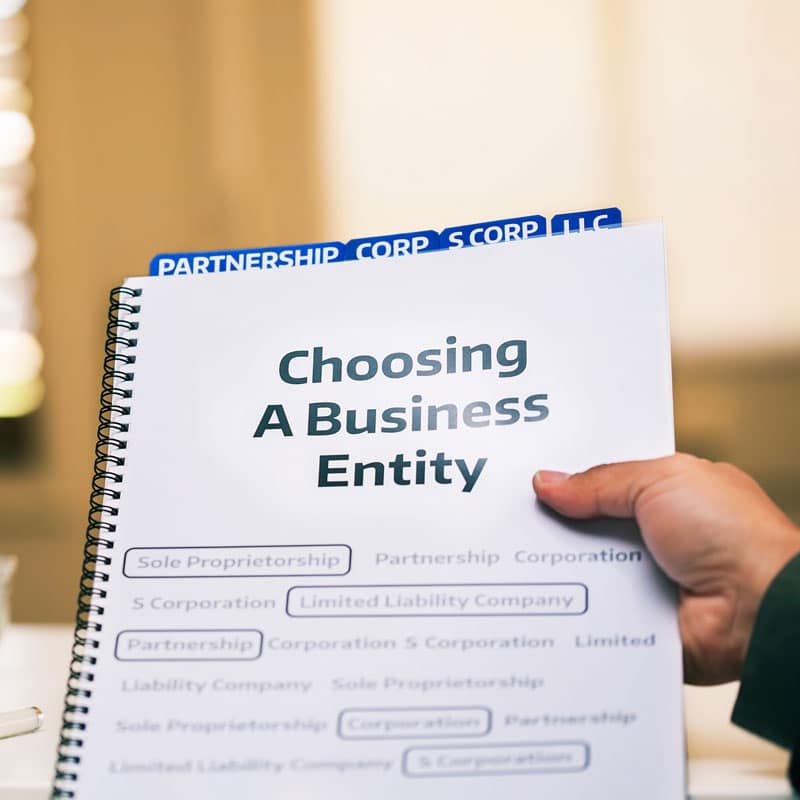Every day, dozens of entrepreneurs in Europe search on Google for terms like "establishing an LLC" or "LLC vs. Inc." Fortunately, you've landed on this page, where we can clearly explain what an LLC is and whether it's the right choice for your business in America. But how does a Limited Liability Company actually work? And what's best for your situation?
An LLC and the similar LLP (Limited Liability Partnership) are formed by members, essentially the partners of the company. An LLC is fiscally transparent, meaning that the income and assets are taxed at the individual members and/or partners level. The LLC and LLP also provide legal protection for the members, as they are not personally liable for the company's debts. It's important to note that debts are distinct from claims and liabilities.
Sometimes we come across recommendations for a Delaware LLC or Inc. Delaware was historically well-regarded for its flexibility and well-developed corporate laws. However, other states have caught up, and Delaware is no longer the default choice.
What works best for you? Our experts can provide detailed guidance in a personal consultation. This page is informational and offers general tips to consider before opening your own LLC in the USA.

If you used to go to the Chamber of Commerce to register in the trade register, it often resulted in a "Sole Proprietorship." If you ask an accountant in Europe what is best—a Sole Proprietorship, General Partnership, or Private Limited Company —they will do the calculations and come back with a comprehensive analysis. They'll determine which is more advantageous and identify which legal structure allows you to pay more or slightly less in taxes.
If you pose the same question to an experienced entrepreneur, you'll almost always conclude with "a Limited Company." And as the saying goes, "One Entity is no Entity," leading to the well-known structure of a Holding Company with one or more Operating Companies underneath. The structure of a company is often influenced by the balance between tax schemes on one hand and liability on the other. Or perhaps you have a patent in one entity and a property in another!
Regarding an online store in the USA, you frequently encounter the LLC on various internet forums as a solution. This creates a sort of company in the USA that exists only on paper: a so-called shell company. Keep in mind that the profits of an LLC are attributed to the owners of the LLC and not to the LLC itself. Therefore, taxes would be levied in Europe, where you, as the owner, reside.

We often encounter the following sentence structure online: "the profits of the LLC are attributed to the owners of the LLC and are therefore usually not taxed in the US." That little word "usually" makes the whole sentence intriguing. Having inventory is already a reason for the IRS (Internal Revenue Service) to consider you liable for taxes in America. At a certain level of revenue and when distributing profits, you may find that you also owe taxes in America. Additionally, banks have become very cautious about facilitating bank accounts for shell companies.
So, despite all the well-intentioned advice you may find online, always ensure you get informed guidance to determine the best solution for your specific situation.
"You might say, 'But... a DIY website says to establish an LLC in Wyoming, and then you won't pay taxes!'There is a tax treaty between Europe and the U.S., but you must adhere to certain conditions. If you make a mistake or 'forget' to pay taxes in the U.S., it will eventually catch up with you in Europe. Good preparation is essential here as well."
"You might say, 'But... I read somewhere that an LLC is the most suitable form for European entrepreneurs who simply want a presence in the U.S. for their Amazon store.' Statements like these give us chills. You must meet numerous conditions, and just having inventory — which you would have with Amazon or 3PL partners — is reason enough to garner the IRS's attention. A sole proprietorship in the USA? A partially effective product liability insurance? Incorrect labeling on your products? Shipping without proper research in California? The Van Holland Group cannot assist with these vague arrangements."
"But, ChatGPT said..." Remember that AI-generated answers translated into other languages typically do not accurately convey arrangements involving a Blocker Entity and European shareholders.

It's a stretch to directly compare a Sole Proprietorship, General Partnership, and a Private Limited Company all at once in the American context, but European entrepreneurs often seek to add an extra layer of protection when doing business in the USA due to the litigious culture. Consider utilizing a Blocker Entity.
One reason for the popularity of this business structure is that, under normal circumstances, neither shareholders nor board members are personally liable for the corporation.
When establishing your USA LLC or Inc., it's all about tailored advice. It's beyond the scope here to deeply explore S-Corp, C-Corp, LLC, and LLP intricacies. What are the chances of issues arising? Can some responsibilities be shifted to, for instance, export agents or partners? Are the owners European or American? What are the advantages and disadvantages in either case? In which country are you currently paying taxes? Are you producing a product that's part of the food chain, or is it a component for aircraft? These are all considerations that our experienced export lawyers and tax advisors can analyze for you to provide the best possible guidance.
Your choice of a specific business structure also depends on your product or service and how you plan to approach the market. Consider, for instance, distribution channels in your particular industry or sector.
Naturally, you'll also need an accountant in America. What taxes do you need to pay to the IRS, and how much? What local permits are required? The Van Holland Group can help you with all these questions, from establishing your own LLC or Inc. to filing annual tax returns and everything in between and beyond.
All clients and customers of the Van Holland Group who have their own Inc. automatically become part of the "Advisory Board Network." This network comprises a team of legal experts, attorneys, accountants, and other entrepreneurs who have already taken the leap into the USA. This ensures we can always support you with guidance and assistance, and connect you with the right people when needed.
Unfortunately, LLCs are usually not the best vehicle for initial entry into the U.S. (with a few exceptions). A single-member LLC implies responsibility not only for U.S. income tax but also for the branch profits tax of the U.S. subsidiary. Additionally, an LLC requires the foreign parent company to prepare the U.S. tax return, thereby shifting the risk of U.S. liability for any intentional or unintentional errors onto the foreign parent company.
Imagine you are starting in the U.S. with two partners from Europe and a German investor. Both European partners might have a Holding BV and Operating BV, while the German investor has a GmbH. In such a scenario, it might be beneficial to start an LLC. Alternatively, you might want maximum protection and separation between the investment and the business, perhaps opting for a hybrid solution. As you can see, there are always exceptions and reasons to approach things differently in special cases. That's why the right first step is always a complimentary personal consultation with our USA experts!
Open a flexible location and expand your business from economically favorable states.
If you are ready to make positive changes.
While it's not exactly the same, an INC is somewhat similar to a BV or GMBH.
We are more than happy to provide a customized quote for your business.
The Van Holland Group supports you with strategic planning, clear goals, and milestones for entering the U.S. market. Discover our straightforward approach. All prices are transparent and listed online. As an entrepreneur, you want to know exactly what to expect from the start
